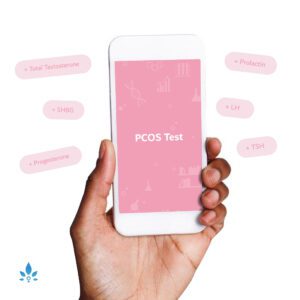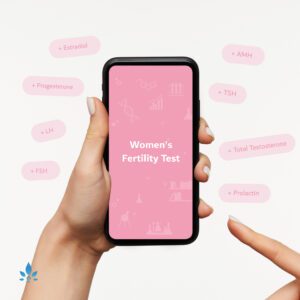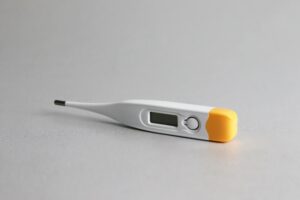What Happens When an Ovarian Cyst Ruptures?


- When an ovarian cyst bursts, it is usually not serious and the body will absorb any blood naturally.
- However, in some cases, an ovarian cyst rupture can cause more internal bleeding and severe pain and this requires immediate medical attention.
- Sometimes surgery is needed to remove the ruptured cyst: this is done via laparoscopy.
One of the clinical symptoms of Polycystic Ovary Syndrome (PCOS) is the formation of a number of small follicular cysts, or fluid-filled sacs, on the ovaries. Surprisingly, given the name of the condition, not all women with PCOS will have ovarian cysts; some will present with signs of androgen excess and anovulation instead. In fact, ovarian cysts in isolation are insufficient grounds on which to base a diagnosis of PCOS and it is possible for cysts to form on the ovaries of otherwise healthy females. One review found that more than 30% of females in the general population have ovarian cysts.
Follicular cysts are a subtype of functional cysts. They arise when the ovary does not release an egg, causing the follicle to keep growing and form a cyst. These cysts are usually painless, symptom-free and can only be detected using ultrasound. Often they will be identified during routine screening for other conditions. It is not uncommon for cysts to grow, rupture and bleed each month as part of the normal menstrual cycle. However, in some cases, ovarian cysts rupture without warning, causing pain and discomfort to the abdominal region.
What causes an ovarian cyst to burst?
Nobody really knows why some cysts rupture. Large cysts are more likely to burst than smaller ones, but small, rapidly growing cysts also seem to be at increased risk of rupturing.
Whilst there is usually no trigger for cyst rupture, strenuous exercise and intercourse have both been implicated.
What complications can occur when an ovarian cyst bursts?
Often a cyst will rupture without causing any significant issues; in these instances, any pain that is experienced can be easily managed using over-the-counter pain relief medications. In some, very rare, cases however, a ruptured cyst causes more severe symptoms, including:
- Intense pain, sometimes described as excruciating.
- Fever. A sign of possible infection.
- Dizziness. May indicate haemorrhage or internal bleeding.
- Rapid breathing/racing heartbeat. Another warning sign of internal bleeding.
- Nausea and/or vomiting. An indicator that cyst contents have leaked into the abdomen.
Internal bleeding and infection can both be very serious and will require prompt medical attention. In severe cases, surgery may be required.
What happens if my doctor, or healthcare provider, suspects a ruptured cyst?
If your doctor or healthcare provider suspects a ruptured cyst they will probably carry out a set of tests in order to rule out other conditions, including appendicitis, kidney stones, ectopic pregnancy and genitourinary infection. These tests may include:
- Ultrasound and CT scans. Will give information about the location and size of the suspected cyst.
- Pregnancy tests. To rule out pregnancy.
- Blood tests. To monitor for infections and anaemia.
- Vaginal culture. To check for infections.
How is a ruptured cyst managed?
Usually the body absorbs the contents (blood, mucus and fluid) of a burst ovarian cyst without the need for medical intervention. When surgery is required it will normally involve a laparoscopic procedure to remove the cyst and ruptured contents. If there are signs of infection, antibiotics will be recommended; and, pain relief medication can be used to alleviate abdominal discomfort. Additional fluids or blood may be required if there has been substantial internal bleeding.
In many cases, however, ruptured cysts will naturally heal themselves and the only treatment needed is short-term monitoring to ensure no complications develop later.
Nabta is reshaping women’s healthcare. We support women with their personal health journeys, from everyday wellbeing to the uniquely female experiences of fertility, pregnancy, and menopause.
Get in touch if you have any questions about this article or any aspect of women’s health. We’re here for you.
Sources:
- Dewailly, D., et al. “Definition and Significance of Polycystic Ovarian Morphology: a Task Force Report from the Androgen Excess and Polycystic Ovary Syndrome Society.” Human Reproduction Update, vol. 20, no. 3, 16 Dec. 2013, pp. 334–352., doi:10.1093/humupd/dmt061.
- “Management of Ruptured Ovarian Cyst.” Johns Hopkins Medicine, https://www.hopkinsmedicine.org/health/treatment-tests-and-therapies/management-of-ruptured-ovarian-cyst.
- “Management of Ruptured Ovarian Cyst.” Management of Ruptured Ovarian Cyst – Health Encyclopedia – University of Rochester Medical Center, www.urmc.rochester.edu/encyclopedia/content.aspx?contenttypeid=135&contentid=346.
- “When an Ovarian Cyst Ruptures: Is It an Emergency?” Health Essentials, Cleveland Clinic, 12 Nov. 2019, https://health.clevelandclinic.org/when-an-ovarian-cyst-ruptures-is-it-an-emergency/.













































